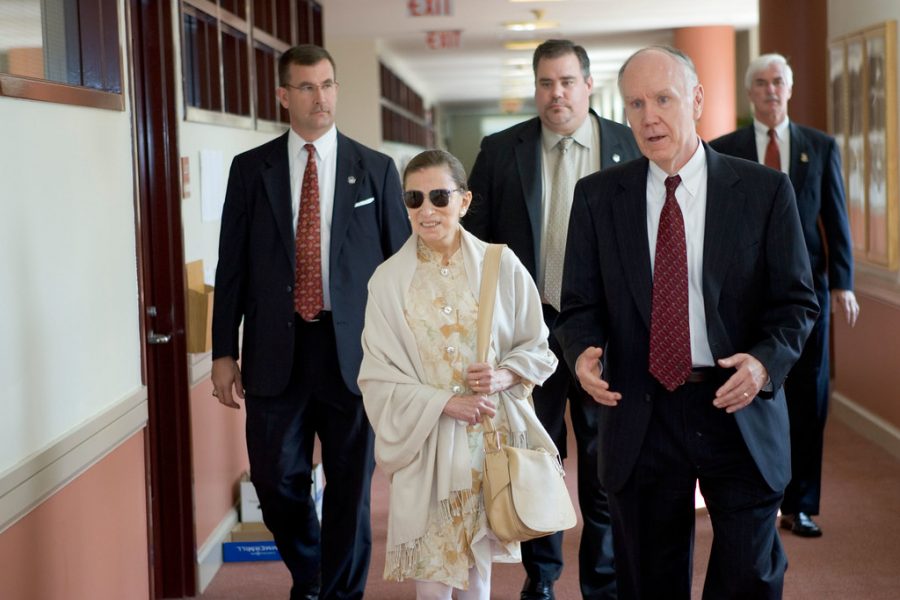Honoring Justice Ginsburg’s legacy in the US, Americans fear changes following her death
Justice Ginsburg was appointed to the Supreme Court in 1993. She was the second woman to serve on the court, following Justice O’Connor.
Associate justice of the Supreme Court of the United States Ruth Bader Ginsburg passed away at the age of 87 on Sept.18 due to complications of metastatic pancreatic cancer.
Ginsburg spent most of her career pursuing the very thing that made life so difficult for her and many women: gender inequality.
Graduating from Columbia Law School after transferring from Harvard, Ginsburg graduated first in her class. After struggling to secure a job at a law firm, she began teaching at Rutgers Law School then at Columbia Law School.
It was not until 1972 that Ginsburg stepped foot into a courtroom to defend a client. Moritz v. Commissioner was the first of many cases Ginsburg would take on to obliterate the laws holding back women back and keeping the country from much-needed change.
In 1972, Ginsburg co-founded the ACLU Women’s Rights Project and became the general council in 1973. Through this movement, Ginsburg participated in over 300 gender discrimination cases by 1974.
In 1980, President Jimmy Carter Appointed Ginsburg to the U.S. Court of Appeals for the District of Columbia circuit. In 1993, Ginsburg was appointed to the Supreme Court by President Bill Clinton.
During her time on the Supreme Court, Ginsburg was victorious in passing laws that pursued equality, including ones that stated that employers cannot discriminate against employees based on gender or reproductive choices. She also legislated laws that require state-funded schools to admit women, ensure women have the right to financial independence and equal benefits, men are entitled to the same caregiving and Social Security rights as women and juries women.
In court, over 200 of Ginsburg’s arguments took form in actions such as the Lily Ledbetter Fair Pay Act. This act was signed by President Obama in 2009 and prohibits gender-based wage discrimination.
Ginsburg leaves three liberal Supreme Court Justices to carry the weight she has left as the leader of the Democratic Party. Her absence is truly felt, especially with so many conservative justices still in power. This concerns many Americans due to the changes being made without the legitimacy of a full court.
With Ginsburg’s absence, there is a 6-3 majority for conservatives, which gives them the upper hand in Supreme Court decisions. Some current issues include the deportation of DACA recipients (also known as Dreamers) by the Trump administration, abortion rights and upholding bans on large church gatherings during the pandemic.
On her deathbed, Ginsburg stated, “My most fervent wish is that I will not be replaced until a new president is installed.” This is currently creating arguments in and outside of the Senate concerning Ginsburg’s replacement.
President Trump claimed in a Fox News interview that Ginsburg’s wish “came out of the wind” and says that it could’ve been written up by one of her fellow representatives. Trump thinks that the Court should act quickly as the election is coming up to replace Ginsburg’s position so that things run smoothly, disregarding Ginsburg’s wish.
“More than any other person, she can take credit for making the law of this country work for women.”
Supreme Court Justice Elena Kagan said concerning Ginsburg. With Ginsburg’s passing, Americans have lost the country’s leading advocate for women’s rights and it is unclear if her replacement will have the same interests in mind.
On Sept. 26, roughly a week after Ginsburg’s passing, President Trump nominated Amy Coney Barrettt to replace Ginsburg’s seat in the Senate. If Barrett is confirmed as the next Supreme Court Justice, the court will have a majority of Republican conservatives who will possibly rewrite what Ginsburg worked so hard to establish.
“We are at last beginning to relegate to the history books the idea of the token woman,” Ginsburg said. Hopefully Ginsburg’s passing will not result in the diminishment of any of the steps she took for women and for gender equality.
Ginsburg is missed by many, though greatly remembered by women who can now do so much more because of a woman that gave her life to ensure the freedoms that the United States has to offer.

Hey there! I'm Nicco Pelicano, your friendly neighborhood Viewpoints editor. I'm a writing & rhetoric major with a concentration in creative writing...







